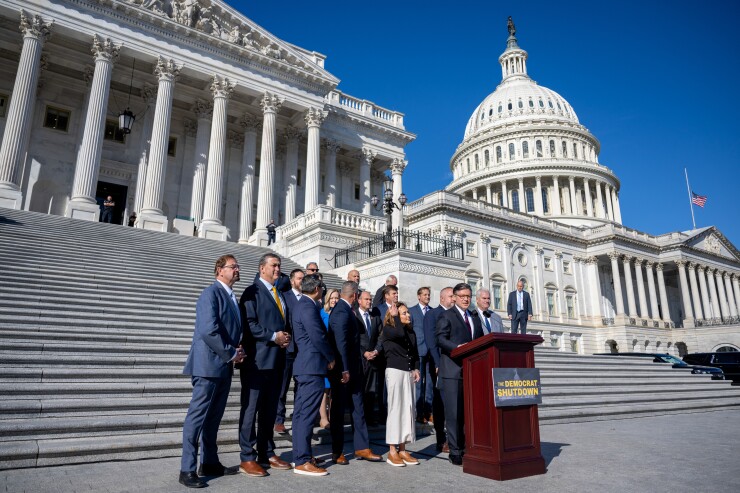- What's at stake: Legislation that could rewrite the financial system, like deposit insurance and market structure bills, are up for debate in the coming months in Congress.
- Forward look: There's not a lot of time for Congress to address these issues before some lawmakers need to return to their districts to campaign.
- Key insight: Both items have some momentum behind them, but would require the administration to whip votes to push them past the finish line.
WASHINGTON — The federal government shutdown has officially ended, which means that Congress can return to big-ticket items for the banking industry.
President Donald Trump signed a bill ending the federal shutdown yesterday after the Senate reached a compromise that funds the government through January. That gives lawmakers several weeks to move forward with non-funding priorities before government funding expires again and the 2026 midterm campaigns begin in earnest. That gives Congress a slim window to push ahead on marquee legislation, including a
"The more Congress is in session, the more bandwidth there is to get things done," said Ed Mills, a managing director at Raymond James. "And when we think about financial services bills, banking bills, those are things that get added to the schedule when there's extra bandwidth. Those are not normally things that drive the schedule."
The House — which has been out of session for more than a month as House Speaker Mike Johnson, R-La., sent Republicans back to their districts during the shutdown — is hosting a hearing next week on deposit insurance reform. The issue is a
A bill that would raise the deposit insurance limit to $10 million for non-interest-bearing business accounts from Sens. Bill Hagerty, R-Tenn., and Angela Alsobrooks, D-Md., earned the endorsement and sign-off from the Independent Community Bankers of America, an influential community bank trade group. But opposition to the measure has been brewing, particularly from certain state groups and individual small community bankers. Large banks have also pushed back on the measure because it would exclude them from offering the expanded deposit insurance while still having to pay for the added coverage through assessment fees from the Federal Deposit Insurance Corp. to expand the Deposit Insurance Fund.
With the issue unresolved among the banking industry and a tight window to move, the deposit insurance bill will be difficult to pass. Ed Groshans, a financial services senior vice president at Height Capital Markets, said with a heavy push from the administration — particularly Treasury Secretary Scott Bessent — the bill could still make it over the finish line.
Bessent has generally supported the idea of deposit insurance reform, and Treasury worked closely with Hagerty's office on the reform bill, according to two people familiar with that relationship. He's expected to continue pushing behind the scenes for this bill, in some form or another, to become law.
"You see how nettlesome it becomes quite quick," Groshans said. "That's why if Bessent didn't step into the mix I would say, no it's not going to get done. He's got a lot of work to do between now and May to get it going. That's the only way I see this going on, if he steps up and starts leaning on the scales."
A more likely push from the Trump administration and from Republicans is market structure legislation that would lay out regulatory jurisdiction between the Securities and Exchange Commission and the Commodity Futures Trading Commission over a variety of crypto assets. The Senate Agriculture Committee released a draft of their version of a bill earlier this week, but it's the Senate Banking Committee that'll address any bank-specific issues in its yet-to-come legislation.
Bankers
But that's not a likely outcome of the crypto discussions, Groshans said.
"I don't think the yield issue is going to make it into market structure," he said. "That's something they could come back and revisit in another bill, but stablecoins are done under the GENIUS Act, and what we're looking at here, what authorities do the SEC and CFTC have."
Instead, lawmakers are looking at the deposit insurance bill to remedy the flight of deposits that bankers fear could come with more widespread adoption of stablecoins and wider use of crypto.
"I don't think you can separate this from the deposit insurance divide," Mills said. "As much as the bankers don't want to admit it, this is a fight between the banking industry and the crypto world. For the most part, the crypto world has been winning."
Mills said that the concern from the banking industry is that stablecoins could be the "money market fund event of our generation," recalling the flight of deposits that occurred when money market funds were
"Especially if stablecoins can essentially pay yield and stablecoins have a senior lien position in bankruptcy, that is a much better position than uninsured deposits — large deposit relationships will be incentivized to move that deposit to a stablecoin," Mills said. "So is there going to be a way of keeping that deposit as a deposit, because customers are going to want to have that insurance, so moving up the insurance level is kind of a pull to keep those deposits as deposits rather than a transition to stablecoin."







